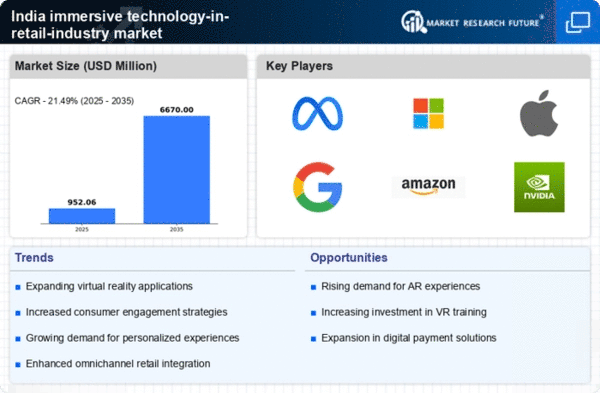Changing Consumer Preferences
Consumer preferences in India are shifting towards more interactive and engaging shopping experiences, which is a significant driver for the immersive technology-in-retail-industry market. As consumers increasingly seek personalized and immersive experiences, retailers are compelled to adopt technologies that cater to these demands. Surveys indicate that around 70% of Indian consumers express a preference for shopping experiences that incorporate AR or VR elements. This trend suggests that retailers who fail to adapt may risk losing market share. The immersive technology-in-retail-industry market is thus responding to these changing preferences by offering solutions that enhance customer engagement and satisfaction. Retailers are investing in immersive technologies to create unique experiences that resonate with the modern consumer, thereby driving growth in the market.
Technological Advancements in Retail
The rapid evolution of technology is a primary driver for the immersive technology-in-retail-industry market. Innovations such as augmented reality (AR) and virtual reality (VR) are becoming increasingly accessible to retailers in India. As of 2025, the market for AR and VR in retail is projected to reach approximately $1.5 billion, indicating a robust growth trajectory. Retailers are leveraging these technologies to create engaging shopping experiences, allowing customers to visualize products in their own environments. This not only enhances customer satisfaction but also drives sales conversions. Furthermore, the integration of artificial intelligence (AI) with immersive technologies is expected to further personalize the shopping experience, making it more appealing to consumers. Thus, the continuous technological advancements are likely to propel the immersive technology-in-retail-industry market forward.
Competitive Pressure in the Retail Sector
The competitive landscape of the retail sector in India is intensifying, which serves as a significant driver for the immersive technology-in-retail-industry market. As more retailers enter the market, the need to stand out becomes paramount. Immersive technologies offer a unique way to differentiate offerings and capture consumer attention. Retailers are increasingly adopting AR and VR to create innovative marketing campaigns and in-store experiences that engage customers. This competitive pressure is likely to push more retailers to invest in immersive technologies, as they seek to enhance brand loyalty and customer retention. The immersive technology-in-retail-industry market is thus expected to grow as retailers strive to leverage these technologies to gain a competitive edge.
Increased Investment in Retail Technology
Investment in retail technology is surging in India, serving as a crucial driver for the immersive technology-in-retail-industry market. In 2025, it is estimated that Indian retailers will allocate over $2 billion towards adopting advanced technologies, including immersive solutions. This influx of capital is primarily aimed at enhancing customer experiences and operational efficiencies. Retailers are recognizing the potential of immersive technologies to differentiate themselves in a competitive landscape. By integrating AR and VR into their offerings, they can create memorable shopping experiences that attract and retain customers. This trend of increased investment is likely to sustain the growth of the immersive technology-in-retail-industry market, as more retailers seek to innovate and stay ahead of consumer expectations.
E-commerce Growth and Digital Transformation
The ongoing growth of e-commerce in India is significantly influencing the immersive technology-in-retail-industry market. As online shopping continues to expand, retailers are increasingly looking for ways to bridge the gap between physical and digital experiences. The immersive technology-in-retail-industry market is poised to benefit from this trend, as retailers adopt AR and VR to enhance their online platforms. By 2025, e-commerce in India is projected to reach $200 billion, prompting retailers to invest in immersive technologies that can provide a more engaging online shopping experience. This digital transformation is likely to drive the adoption of immersive solutions, as retailers aim to create seamless experiences that attract online shoppers and encourage them to explore products in a more interactive manner.
















